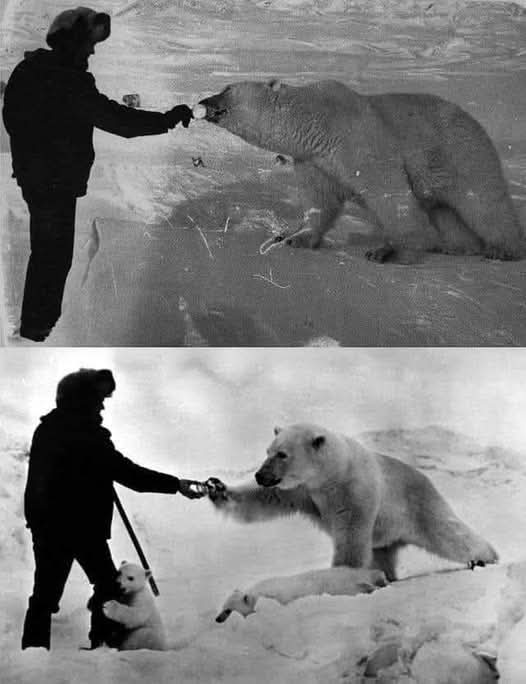the vast, frozen wilderness of Chukotka, Russia—where icy winds howl across endless tundra and the sun often hides for months—a remarkable story of compassion and trust unfolded in the winter of 1974. It was there, amid the harshest of conditions, that a young polar bear cub named Masha faced certain death. Her mother had been shot by a hunter, leaving the tiny creature orphaned and alone in a land where even the strong struggle to survive. Too small to hunt and too vulnerable to fend off predators or the cold, Masha’s fate seemed sealed.But fate had other plans.Enter Nikolai Machulyak, a Soviet geologist and explorer with a deep respect for the natural world. During one of his expeditions across the icy terrain, he stumbled upon the frail cub curled up in the snow, shivering and barely alive. Most would have moved on—after all, wild animals are not pets, and a polar bear, no matter how small, is still a dangerous predator in the making. But something stirred in Machulyak. Perhaps it was the helplessness in the cub’s eyes or the fierce will to live beneath her fragile frame. Whatever it was, he couldn’t leave her.Moved by compassion, Machulyak made a bold decision: he would care for the cub through the brutal Arctic winter. Each day, he brought her food—fresh fish when he could get it, scraps of meat, and even condensed milk, which Masha greedily lapped up. Slowly, day by day, the cub regained her strength. Under his quiet guardianship, she grew healthy and playful, roaming the area around his outpost but always returning to him. A strange, unspoken bond formed between man and beast—a relationship built not on dominance or fear, but on trust and survival.As spring approached and the snow began to thaw, Masha wandered off into the vastness of the tundra. It was a natural goodbye. Machulyak, though saddened, understood: she was a creature of the wild. Perhaps she would forget him, as wild animals often do, and live out her days among her kind. He never expected to see her again.But the Arctic had another surprise in store.In February 1976—two years later—Masha returned. No longer a cub, she had grown into a magnificent adult, weighing over 150 kilograms. Machulyak, stunned by her reappearance, was even more astonished when she recognized him instantly. She approached without fear, accepting the food he offered just as she had years before. She remembered.Then came an even greater surprise. Masha was not alone. By her side stood a much larger polar bear—another female, regal and imposing, who would come to be known as Mariya Mikhailovna. Whether she was a companion, a sister, or a guardian, no one could say. What mattered was that she, too, showed no aggression toward Machulyak. Cautiously at first, but soon with increasing familiarity, she began accepting his offerings of food.From that point on, Machulyak fed both bears regularly. Word of this extraordinary friendship spread quickly through the region and beyond. Visitors and journalists made the arduous journey into the tundra to witness this living paradox—an unarmed man, face-to-face with two of nature’s most formidable predators, sharing space, food, and something deeper: mutual respect. It defied all logic and stirred the imagination.Yet, no matter how magical, nature is never truly tame. Polar bears are wild animals—powerful and unpredictable. Machulyak’s wife, fearing for his safety, eventually pleaded with him to end his interactions with the bears. With great reluctance, he agreed. He stopped bringing food. He stayed away from their territory. And, in time, the bears vanished once again into the endless white.Their pawprints faded from the snow, but the memory of their presence lingered like a dream.Had they truly remembered him? Could bonds like that survive the wilderness and the pull of instinct? These questions remain unanswered. But the tale of Masha and Mariya Mikhailovna lived on, immortalized in the 1977 story Request for Friendship (Zayavka na druzhbu), a touching tribute to a fleeting connection that defied the boundaries between man and wild.This was not a story of domestication or conquest. It was something far rarer—a quiet moment of harmony in one of the world’s most unforgiving places. A reminder that even in the harshest of landscapes, empathy and trust can take root, if only for a time, between species that were never meant to meet on equal ground.
